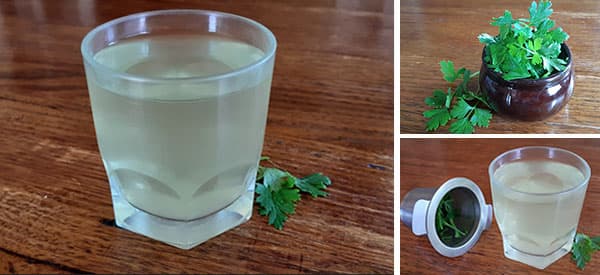
Parsley Tea for Inflammation of The Urinary Tract
Updated: 13 March 2025
Parsley is a somewhat underrated herb. Not only is it tasty, but its medicinal properties are varied. It’s easy to grow since it also self-seeds. You can harvest parsley in most climates throughout the spring and early summer. For the best-tasting parsley, prune off any flowers as they develop, otherwise leave the flowers to be pollinated by the insects in your garden and then harvest the nutritious seed instead.
Parsley Benefits and Medicinal Properties
Parsley contains an abundance of minerals and is particularly high in calcium, boron, and fluoride. The amount of vitamin A, C, and K are outstanding and it contains a decent amount of the vitamin B complex. There are a wide variety of other vitamins, flavonoids, amino acids, and terpenes as well. Of course, all of these compounds are only present when you ingest parsley. When you brew a cup of tea from fresh or dried parsley leaves, you will only ingest the water-soluble compounds.
So why choose to brew some parsley tea to help treat urinary tract inflammation? The theory is that by increasing your water intake (in the form of tea) you are potentially “flushing” out the cause of the urinary tract inflammation when you pee. And by brewing parsley tea, you will also benefit from water-soluble compounds such as vitamin C and the vitamin B complex, as well as boron and some mineral salts.
In addition to the increased water intake, parsley tea also has a natural diuretic effect, but unlike other diuretics, parsley flushes out sodium and water while potentially increasing the re-absorption of potassium.
Many studies show that parsley is a good anti-inflammatory, probably due to its vitamins and apigenin glucose, as well as a strong antioxidant. Both are great for treating any ailment.
⇒ The Common Backyard Weed That Fights Inflammation (Video)
Anti-Inflammatory Parsley Tea
Ingredients
This remedy tries to utilize as many of the water-soluble compounds as possible. Even though there are some differences between fresh and dried, concerning minerals and nutrients, they are similar enough that they can be used interchangeably.
- 1 – 2 teaspoons of dried parsley leaves/ 1 – 2 tablespoons of fresh parsley leaves
- Warm water
Method
- To preserve the vitamin C in the leaves, the water should ideally stay below 140 F (60 C). Therefore, this tea is best made in a pot on low heat on the stovetop. Of course, you can pour boiling water directly over the leaves, but be aware that this will decrease the vitamin C content.

- Brew the parsley leaves in a pot of warm water for at least 5 minutes (10 minutes will produce a stronger taste). If you are using fresh leaves and stems, then pound and mash them up a bit while they are brewing in the water. For dry leaves, simply stir.
 Strain away the leaves.
Strain away the leaves.
- Your parsley tea is ready. Enjoy!

Dosage
Drink a cup of parsley tea 3 times a day for at least 2 weeks or until the relief of symptoms.
As a preventative, drink a cup of parsley tea 1 – 2 times a week.
2 More Preparation Methods for Parsley Tea
Parsley tea can be prepared using either fresh or dried parsley, with each method offering a slightly different flavor profile.
Hot Parsley Tea:
Ingredients:
- 1 cup of fresh parsley leaves (or 2 tablespoons dried parsley)
- 2 cups of filtered water
- Optional: Honey or lemon to taste
Instructions:
- Rinse the parsley thoroughly to remove any impurities.
- Bring the water to a boil in a saucepan.
- Add the parsley to the boiling water and let it simmer for about 5-7 minutes.
- Remove from heat and let it steep for an additional 5 minutes.
- Strain the tea into a cup, discarding the parsley leaves.
- Add honey or lemon if desired, and enjoy your warm cup of parsley tea.
Cold Parsley Tea:
Ingredients:
- 1 cup of fresh parsley leaves (or 2 tablespoons dried parsley)
- 2 cups of filtered water
- Optional: Ice cubes, honey, or lemon
Instructions:
- Follow steps 1 through 4 from the hot tea preparation to brew the tea.
- Allow the tea to cool to room temperature, then refrigerate until chilled.
- Serve over ice, adding honey or lemon if desired.
Potential Side Effects and Contraindications
While parsley is generally recognized as safe when consumed in typical food amounts, excessive intake, especially in medicinal quantities, can lead to adverse effects:
Allergic Reactions: Some individuals may experience allergic responses, ranging from skin rashes to more severe symptoms like difficulty breathing.
Kidney and Liver Concerns: Parsley oil contains compounds that can cause serious side effects, including kidney and liver damage, as well as hallucinations.
Pregnancy: Parsley contains apiol and myristicin, compounds that can stimulate uterine contractions. Therefore, pregnant women should avoid consuming large amounts of parsley or parsley oil.
Medication Interactions: Parsley is rich in vitamin K, which plays a crucial role in blood clotting. Consuming large amounts may interfere with blood-thinning medications like warfarin.
It’s advisable to consume parsley tea in moderation and consult with a healthcare provider before incorporating it into your routine, especially if you have underlying health conditions or are taking medications.
Alternative Natural Remedies for Urinary Tract Health
In addition to parsley tea, several other natural remedies may support urinary tract health:
Cranberry Juice: Rich in proanthocyanidins, cranberry juice may help prevent urinary tract infections (UTIs) by inhibiting bacterial adhesion to urinary tract walls.
D-Mannose Supplements: D-Mannose is a type of sugar that can prevent certain bacteria from sticking to the urinary tract lining, potentially reducing UTI risk.
Uva-Ursi (Bearberry) Tea: This herb has been traditionally used to treat UTIs due to its antimicrobial properties. However, it should be used cautiously and under professional guidance.
Hydration: Drinking ample water helps flush bacteria from the urinary system, reducing infection risk.
Probiotics: Consuming probiotics may promote a healthy balance of bacteria in the urinary tract, potentially preventing infections.
It’s important to consult with a healthcare provider before starting any new remedy, especially if you have underlying health conditions or are taking medications.
Lifestyle and Dietary Recommendations for Urinary Tract Health
Maintaining a healthy urinary tract involves several lifestyle and dietary practices:
Stay Hydrated: Drinking sufficient water daily helps dilute urine and ensures regular urination, which can prevent bacterial growth.
Practice Good Hygiene: Wiping from front to back and urinating after sexual activity can reduce the risk of introducing bacteria into the urinary tract.
Limit Irritants: Reducing intake of bladder irritants like caffeine, alcohol, and spicy foods may help prevent urinary discomfort.
Include Cranberry in Your Diet: Consuming cranberry products may help prevent UTIs by preventing bacteria from adhering to the urinary tract lining.
Maintain a Healthy Weight: Being overweight can increase pressure on the bladder, leading to urinary issues.
Avoid Smoking: Smoking can irritate the bladder and increase the risk of urinary tract cancers.
Regular Physical Activity: Exercise can improve overall health and support urinary tract function.
Implementing these practices can contribute to better urinary tract health. However, it’s essential to consult with a healthcare provider for personalized advice, especially if you experience urinary symptoms or have underlying health conditions.
Final Thoughts
The research into parsley’s diuretic, anti-inflammatory, and antioxidant properties are well documented and it is often recommended for urinary tract and kidney issues. When consumed on a daily basis, it can even serve as a preventative, especially if you have a family history of kidney disease, or are prone to urinary tract infections.
You may also like:
 Homemade Kidney Cleanse Juice
Homemade Kidney Cleanse Juice
How Can I Prevent a Urinary Tract Infection? (Video)

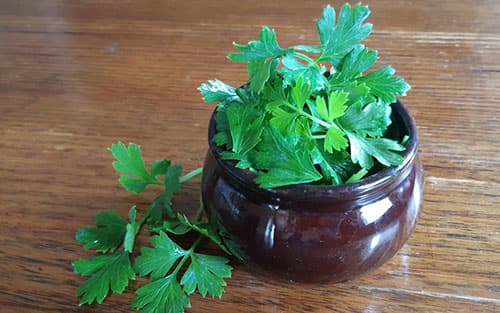
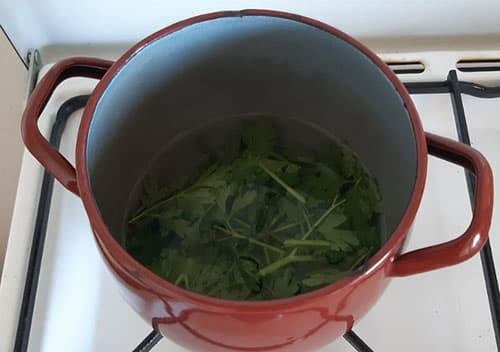 Strain away the leaves.
Strain away the leaves.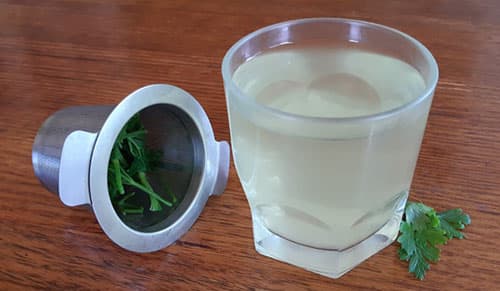
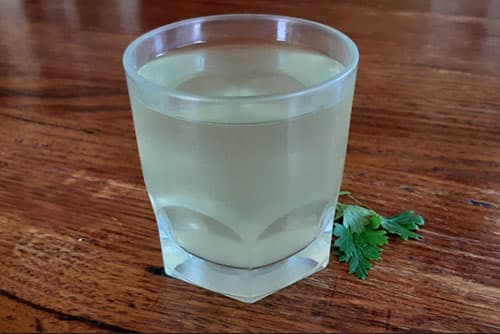
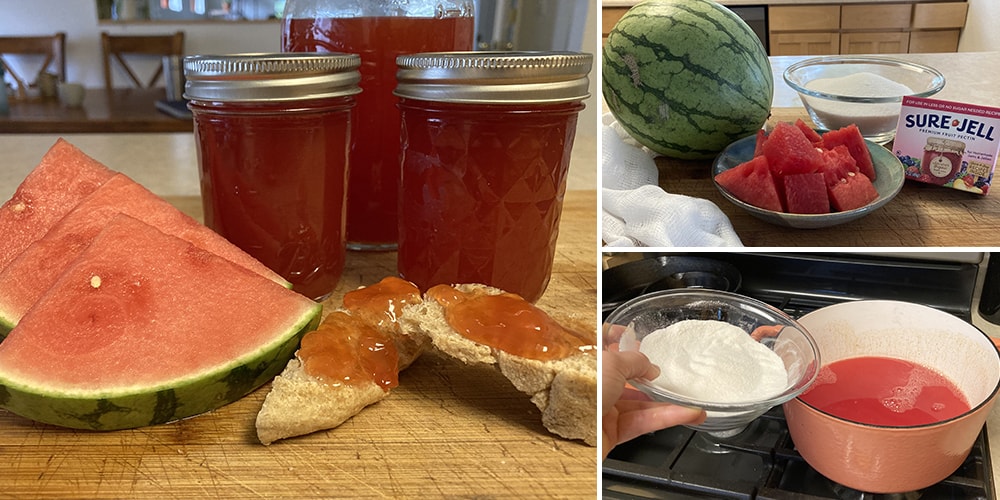


Hi, which kind of parsley works best for this? Curly or Flat leaf?
And could you make a fresh parsley tincture and have similar benefits?
As far as I know, a tincture won’t extract vitamins that are water soluble.
Hello Crystal,
If you prefer a stronger and smoother flavor, you should use Flat-Leaf Parsley.
Parsley Tincture acts as a digestive tonic and breath freshener. It promotes healthy skin and hair, it’s mildly cleansing and it increases red blood cells. It has a diuretic effect and can reduce bladder and urinary tract inflammation.
Many blessings and good health!
Thank you so very much for sharing this with us! I’m on my way to find these ingredients at my friut and vegetable store…I always use organic whenever I can!
Hello Sarah,
Thank you for your comment! We are happy to hear you enjoy our articles.
Organic fruits and vegetables are indeed a better choice.
Many blessings and good health!
Parsley tea is also very good allergy related laryngitis. Every time my daughter gets near mold or the smell of Lavender she loses her voice. Within less than 5 minutes of drinking parsley tea, she can talk again.
Hello Vicki,
Thank you so much for your post! We appreciate you sharing this with us, and we’re really happy to hear that parsley alleviates your daughter’s laryngitis.
Many blessings and good health!
Hello Nicole, I noticed that parsley is not mentioned in LBHR. Would parsley tea help with gout?
Hello Phil,
Parsley is an acid-alkaline food that is beneficial for your body’s pH level, making it good for gout.
Other beneficial herbs are stinging nettle, ginger, turmeric, dandelion, cherry, cinnamon and many others.
Many blessings and good health!
Would parsley tea help with kidney stones and/or what would be recommended?
Hello Iris,
Parsley’s anti-inflammatory properties, as well as its ability to regulate urinary pH and lower blood pressure, may help keep your kidneys healthy and reduce your risk of kidney stones.
Many blessings and good health!